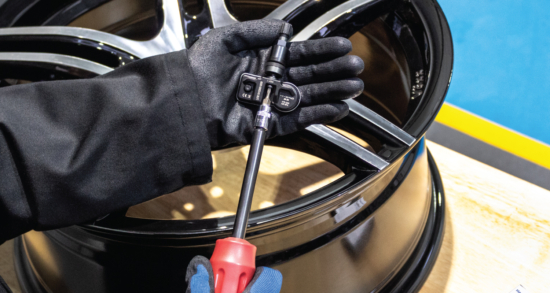Hamaton offers tips for maximising TPMS sales
 Do your technicians know how to replace a sensor without causing damage? Can they spot the signs of corrosion, and identify which
components are serviceable? Hamaton recently offered a number of suggestions to help address these questions. (Photo: Hamaton)
Do your technicians know how to replace a sensor without causing damage? Can they spot the signs of corrosion, and identify which
components are serviceable? Hamaton recently offered a number of suggestions to help address these questions. (Photo: Hamaton)
Hamaton Ltd, a leading TPMS product manufacturer, has shared its tips on how to prepare and take advantage of increased TPMS demand. Hamaton’s tips are summarised with the words: prepare, train and sell.
First, prepare. “Stock up to meet demand. When ‘stocking up’, predicting which vehicles you will encounter, and forecasting volumes can be difficult,” company representatives said. This kind of approach is considerably easier with a universal sensor that covers most of the market and is programmable (meaning it can receive new protocols later). TPMS service work is also an important consideration during the preparation stage. “Whenever you remove a tyre from the rim, OE manufacturers recommend that you service the valve”, therefore Hamaton advises that you also ensure you have enough service kits and valves available.
Another simple yet effective habit for increased productivity is charging your TPMS tool after every working day and keeping it updated. The latter point is of particular importance because each software update provides additional coverage meaning you can service a larger number of vehicles. If you don’t get into good charging habits, you or your team are likely to end up wasting valuable time charging or updating TPMS tools whiles cars are on the ramp.
Of course, Hamaton points out that it offers a wide range of TPMS products. The company particularly points out that, with 99 per cent vehicle coverage and programmability, its EU-Pro Hybrid NFC sensor boasts Near-Field Communication (NFC). This technology facilitates a faster configuration experience via a free Android app.
Train – The next step to better equip your team for success is with training. Do your technicians know how to replace a sensor without causing damage? Can they spot the signs of corrosion, and identify which components are serviceable? Do they understand the difference between each relearn type and know how to perform one effectively? If you do not train your technicians correctly, these processes can become problematic?
Addressing this points, Hamaton highlights its ”comprehensive online TPMS training course, covering all important aspects”, which therefore offers a valuable answer to the question. Furthermore, the company’s website (www.hamaton-tpms.com) is home to resource bank including video tutorials and downloadable guides.
Sell – Hamaton’s TPMS training course includes methods for educating customers about the importance of TPMS and increasing TPMS sales via a range of suggestions. For example, if one sensor battery is low, customers can be advised to replace the other sensors too. The rationale runs like this: If one is flat, the others are likely to follow. Changing them at the same time will therefore prevent the customer from returning, saving them time and money.
Another suggestions is that if your customer has a set of TPMS sensors in their summer/winter tyres, recommend a service because corrosion can occur when valves are regularly exposed to road salt and dirt. Servicing upholds the sensor’s performance which, in turn, helps avoid premature tyre wear that could result in another visit.
Since it became mandatory for all new cars to have a TPMS fitted, the demand for TPMS services has been on the rise, which is set to continue. Moving forward, vehicles are becoming increasingly sensorised and TPMS specialists have been predicting a strong influx of business for years therefore, dealers would. As a result, dealers can benefit from preparation, training and selling support in line with Hamaton’s suggestions.

 Giti Tire
Giti Tire

Comments